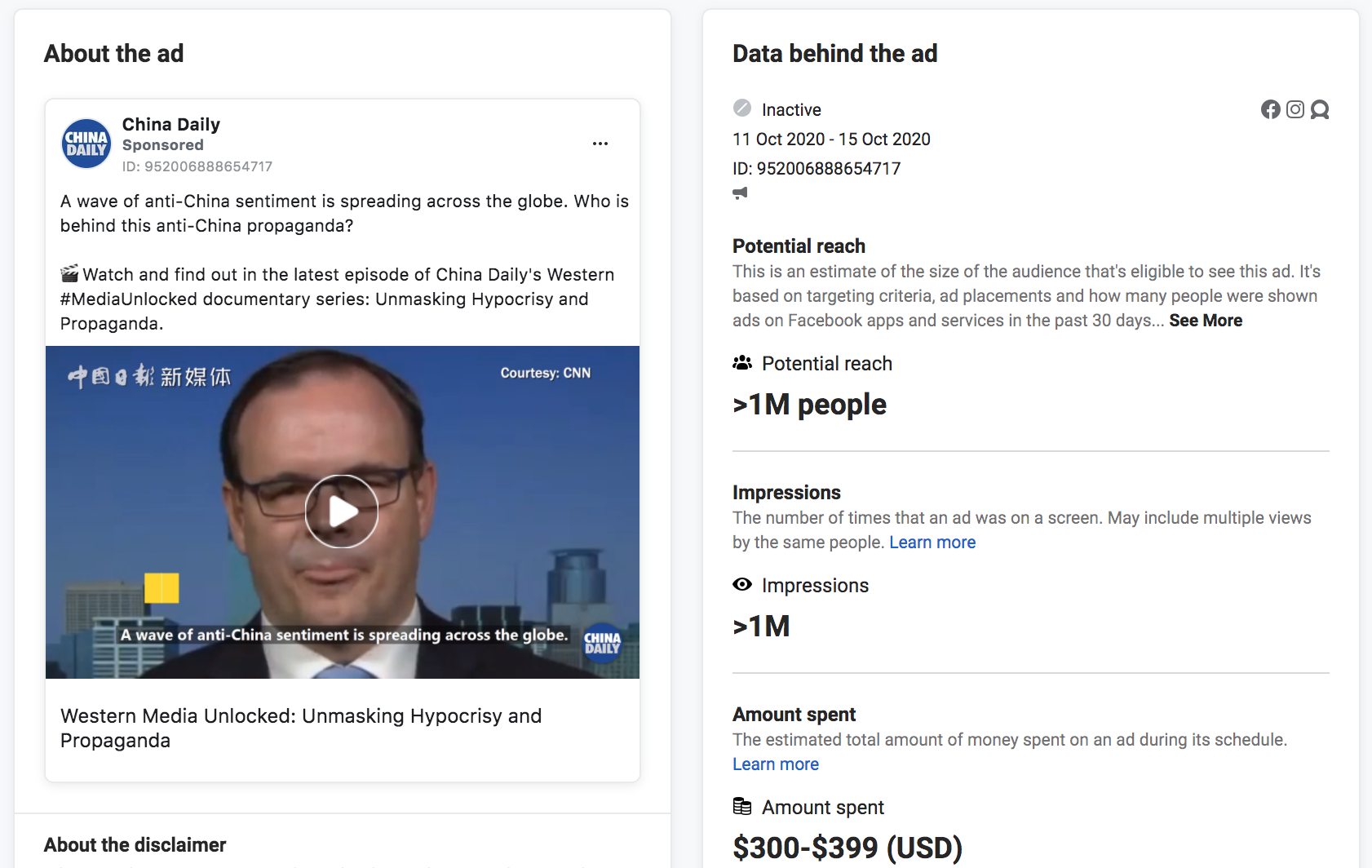
Facebook is taking money from China to promote “propaganda” playing down the plight of Uyghur Muslims, a Press Gazette investigation has found.
China’s treatment of Uyghur people in the western province of Xinjiang has been widely condemned in the West, with the US government figures and others accusing the Chinese Communist Party (CCP) of “genocide”.
US social media giant Facebook has not only allowed state-run outlets like China Daily and CGTN to publish posts that dismiss these concerns as Western “disinformation” – it has accepted advertising payments to help promote this content to millions of people.
Presented with the findings of Press Gazette’s investigation, Imran Ahmed – chief executive of the Center for Countering Digital Hate – said it was “beyond disgusting that Facebook is taking money to promote Chinese state propaganda denying the reality that their state is engaged in crimes against humanity against Uyghur Muslims”.
In one case, by paying Facebook less than $400, China Daily was able to target more than one million users with a video that rubbishes independent press reports from Xinjiang.
The advertised documentary explains how Western “politicians, think tanks and the media work together to align narratives that drive public discussion and pervade the public consciousness often with malevolent intent”.
Another China Daily sponsored post promoted a video claiming that a report on Uyghur camps in Xinjiang was “completely false” and “straight from the manual of Western media tricks”.
A third Facebook advert promoted a clip accusing Western media of spreading “lies” and “disinformation”, telling users: “The tale of an oppressed Xinjiang is a myth Western media refuse to give up.”
CGTN – a Chinese state-run broadcaster that was this month banned from UK screens by TV regulator Ofcom – paid Facebook to advertise a post that promoted the virtues of “vocational training centres” in Xinjiang.
The post quoted a Malaysian diplomat saying: “What we saw during the visit was opposite to some Western media reports, and Xinjiang is seeking an effective way to counter extremism and terrorism.”
Facebook has also promoted several CGTN posts that report on Islamic terrorism in Xinjiang. A US government report last year found that terrorism had been used as justification for the CCP’s crackdown on Uyghur people.
In some of the cases we highlight, Facebook stopped running the adverts on the grounds that the Chinese news outlets did not declare them as political in nature – in breach of the social media giant’s rules. However, most of the banned adverts were able to run for several days and reach hundreds of thousands of users before Facebook stopped promoting them. Most of the posts remain live on Facebook as non-sponsored content.
Despite the fact Facebook is blocked in China, state-run outlets CGTN, China Daily, China Xinhua News, the People’s Daily and CCTV – with the aid of nearly 1,000 adverts between them since 2018 – have become five of the six most ‘liked’ news pages in the world on Facebook, according to a Social Blade ranking.
Many of their promoted posts are innocuous. But once users are encouraged to ‘like’ these outlets’ pages – which are not flagged as being operated by media linked to the Chinese state – they become recipients of political propaganda.
[Sign up for Press Gazette’s must-read newsletters: Media Monitor (strategic insight every Thursday), PG Daily and Marketing Matters]
What is China doing to Uyghur people?
A 2019 US government report estimated that more than one million people – Uyghurs, ethnic Kazakhs, Hui, and members of other Muslim groups, as well as some Uyghur Christians – had been detained by the Chinese government in “specially built internment camps or converted detention facilities” in the region of Xinjiang.
The report said that the Chinese leadership had subjected these people to “forced disappearance, political indoctrination, torture, psychological and physical and psychological abuse, including forced sterilisation and sexual abuse, forced labour, and prolonged detention without trial because of their religion and ethnicity”.
Similar claims have also been independently made by other governments, rights groups, think tanks and independent media outlets like the New York Times and BBC, which have reported from Xinjiang and interviewed people who have been able to escape the region.
The CCP’s denial of wrongdoing in Xinjiang is echoed by the domestic media. According to Reporters Without Borders – which ranked China 177th out of 180 countries in its 2020 World Press Freedom Index – “China’s state and privately-owned media are now under the Communist Party’s close control”.
In addition to reporting the Beijing government’s Xinjiang narrative, China’s media has in recent months made efforts to undermine reporting by Western media outlets (some of which have had to contend with their journalists being expelled from the country).
‘Western Media Unlocked: Unmasking Hypocrisy and Propaganda’
For less than $400, China Daily – published by the Chinese Communist Party – was able to reach more than one million Facebook users with a post advertising a documentary titled “Western Media Unlocked: Unmasking Hypocrisy and Propaganda”.
Facebook’s advertising library shows that the post (in the video above) was targeted at users in Nepal, India, Myanmar, Indonesia and other Asian nations.
The post, promoted on Facebook and Facebook-owned Instagram in October 2020, tells users that a “wave of anti-China sentiment is spreading across the globe” and suggests that the Western media is behind it.
The advertised documentary, which is still available on Facebook, seeks to dismiss claims about the mistreatment of Uyghur people – writing it off as “anti-China propaganda”.
It explains to its viewers that Western “politicians, think tanks and the media work together to align narratives that drive public discussion and pervade the public consciousness often with malevolent intent”.
It is understood that Facebook stopped running, or disapproved, this advert because China Daily failed to declare that it was political in nature. But according to ad library records, it was able to run for five days – between 11-15 October – and was seen by more than one million users.
Unlike on the outlet’s Twitter page and YouTube channel, there is no obvious indication on Facebook or Instagram that China Daily is affiliated with the CCP.
‘The tale of an oppressed Xinjiang is a myth Western media refuse to give up’
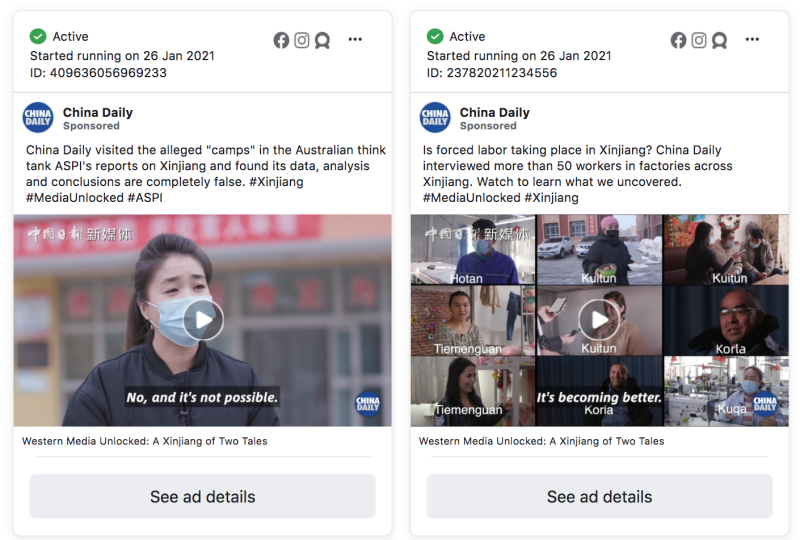
China Daily adverts displayed in Facebook’s ad library on 29 January (they were subsequently removed)
Last month, as the CCP faced growing international pressure over the situation in Xinjiang – including being accused of committing “genocide” by outgoing US secretary of state Mike Pompeo – China Daily sponsored three more posts relating to the Uyghur people.
On 26 January, it paid Facebook to advertise a post that challenged an Australian Strategic Policy Institute (ASPI) report that found evidence of 380 internment camps in Xinjiang.
The post, advertising a video clip, said: “China Daily visited the alleged ‘camps’ in the Australian think tank ASPI’s reports on Xinjiang and found its data, analysis and conclusions are completely false.”
In the advertised documentary, the narrator claims that one of the camps highlighted by ASPI is “simply a detention centre – not unlike thousands of such penal institutions you can find anywhere in the world. But ASPI chooses to call it a camp. It’s a rebranding exercise straight from the manual of Western media tricks”.
Another camp, it claims, is a school surrounded by barbed-wire-topped walls.
Einar Tangen – previously identified by the BBC as an adviser on economic affairs for the Chinese government but described by China Daily as a “current affairs commentator” – says in the film: “I can show you dozens, hundreds of tech schools around China. They have walls around them, they have barbed wire on top – to prevent people from getting in, not from getting out!”
A second sponsored post said: “Is forced labor taking place in Xinjiang? China Daily interviewed more than 50 workers in factories across Xinjiang. Watch to learn what we uncovered.”
And a third said: “Western media reports on China’s #Xinjiang often fail to present the real story. Instead, they incite disinformation by resorting to manipulative editing, citing unfounded reports and appealing to biases, a China Daily special investigation uncovers.”
[Read more: Respect for journalists and big tech accountability: News industry’s wishlist for President Joe Biden]
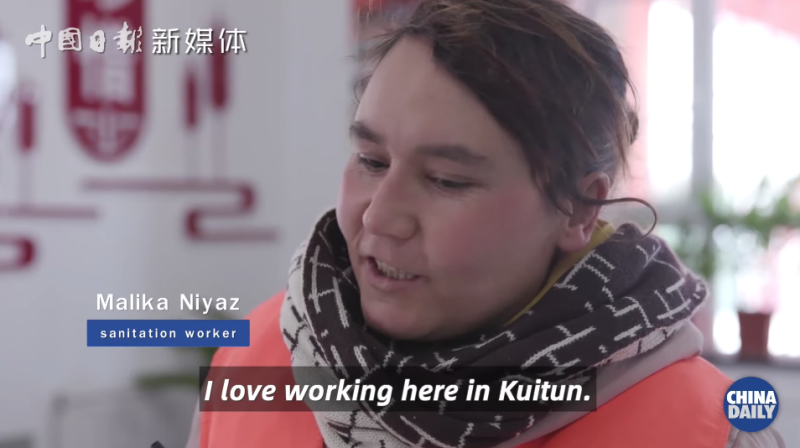
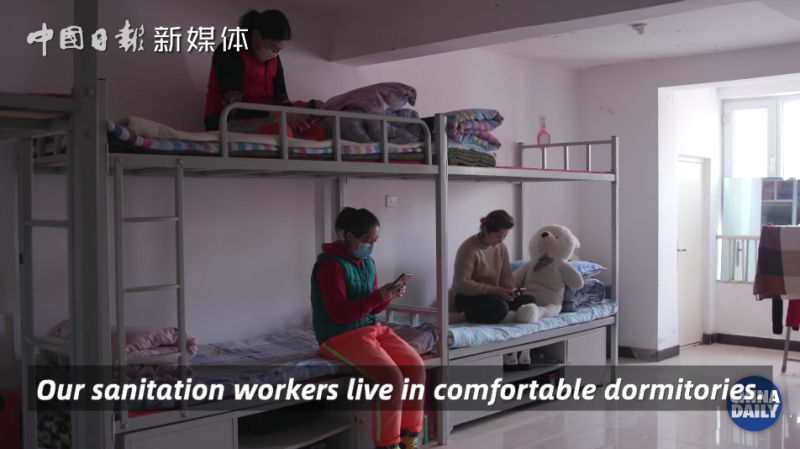
Screenshots from a documentary advertised in China Daily’s sponsored posts
In this video, the narrator accuses Western media of spreading “lies” and “disinformation”. He explains to viewers: “The tale of an oppressed Xinjiang is a myth Western media refuse to give up.”
The video seeks to discredit a New York Times investigation into a “sanitation station” in Kuitun. The narrator said the newspaper “decided to do its filming secretly even though Kuitun sanitation station is open to the media”.
The video is also critical of BBC reporting, and labels Reuters and Associated Press articles as “fake”.
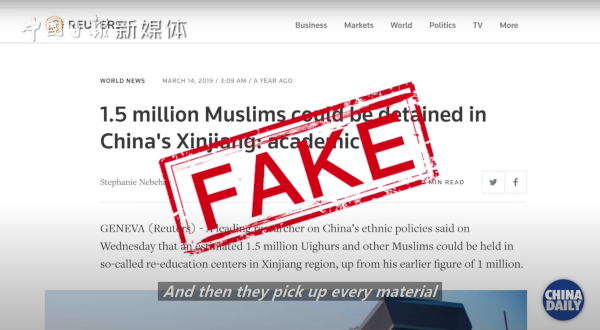
Press Gazette found these posts in Facebook’s ad library on 29 January, three days after they were sponsored. There were no details on how much Facebook was paid to promote these posts or how many people they reached.
The record of them has since been deleted from the ad library, which it launched in 2019 to introduce new transparency around political marketing campaigns.
It is understood that these China Daily adverts were removed from the library because they were not classified as political. Records of adverts that are deemed to be non-political are removed from the library as soon as the advertiser pauses or stops running them.
‘What we saw during the visit was opposite to some Western media reports’
Chinese state media attempts to use Facebook ads to undermine Western reporting from Xinjiang date back at least two years.
In January 2019, CGTN paid less than $100 to promote a post that quoted a Malaysian diplomat saying: “What we saw during the visit was opposite to some Western media reports, and Xinjiang is seeking an effective way to counter extremism and terrorism.”
It links to an article and video on CGTN’s website that promotes “vocational training centres” – i.e. internment camps – in Xinjiang. According to Facebook’s ad library, this post reached less than 1,000 users. This appears to be because it was disapproved – on the grounds that CGTN did not declare it as a political post – on the same day it was sponsored.
Last month, CGTN paid $200-299 to promote an opinion piece on “how Western media distorts #Xinjiang boarding schools”. This sponsored post ran over five days, and was viewed 350-400,000 times, before Facebook decided to take it down – again on the grounds that CGTN did not declare that it was political in nature.
Also last month, for $400-499, CGTN reached as many as one million users with a post titled: “What is the real condition in boarding schools in Xinjiang? What changes have these schools brought to local students? CGTN’s Cui Hui’ao talked to some of the boarders at Shenta Middle School. #Xinjiang.”
This post was also taken down by Facebook because CGTN did not flag it as political. But this action was only taken after it had been live for five days.
Previously, both CGTN and CCTV have also paid Facebook to promote posts that advertise films they’ve made documenting the threat of terrorism in Xinjiang.
Critics of the CCP, including the US government, allege that Xinjiang terrorism has been used as “justification to enact and enforce restrictions on religious practices of Muslims and non-Muslim religious minorities”.
Clickbait promotions for $95,000
Many of the hundreds of posts Chinese state media have paid to promote on Facebook appear innocuous.
One of China Xinhua News’s 480 or so sponsored posts reads: “No way! A 24-story [sic] wooden building constructed without a single nail. Follow us for more.”
According to Facebook records, the outlet spent between $80,000 and $95,000 across nine ad campaigns to promote this post. According to Facebook, each of these nine sponsored posts could have reached more than one million people.
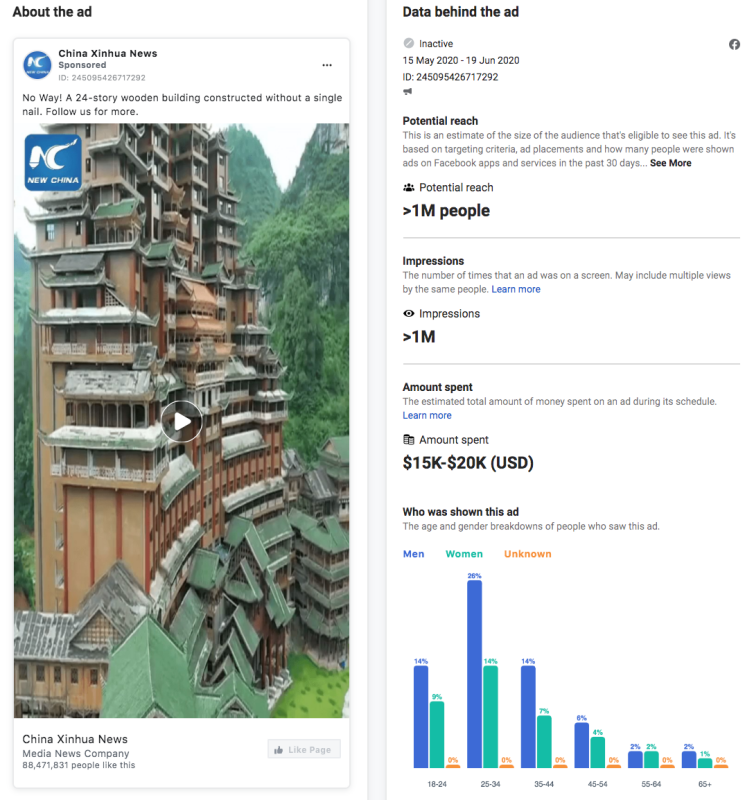
Paying to make posts go viral on Facebook appears to pay off. China Xinhua News’s English-language page has more than 88m ‘likes’.
After users have ‘liked’ the Xinhua page, they receive news updates from the outlet, including many that promote CCP propaganda about Xinjiang.
In July last year, a non-sponsored post said: “The 2019 report on international religious freedom issued by the United States claims that Xinjiang has bulldozed Uygur cemeteries in Aksu and Hotan prefectures. But is that true? Local residents tell you the story.”
A June 2020 post said: “The so-called ‘Uyghur Human Rights Policy Act of 2020’ is an attempt by the United States to infringe on China’s sovereignty, a Russian scholar said.”
China Xinhua News, like China Daily and CGTN, is closely affiliated with the CCP, and widely described as state-run. However, as with China Daily and CGTN – and unlike on Twitter – there is no obvious indication on its Facebook page that China Xinhua News is aligned with the Chinese state.
Instead, the outlet’s ‘About’ section reads: “We are public media for the public good. We never end our quest for facts and truth. Objectivity. Fairness. Balance. We don’t pursue corporate interests, nor will we ever yield to the pressure of ideological stigmatization and political bias.”
‘Beyond disgusting’
Presented with the findings of Press Gazette’s investigation, Imran Ahmed, chief executive of the Center for Countering Digital Hate said: “It is beyond disgusting that Facebook is taking money to promote Chinese state propaganda denying the reality that their state is engaged in crimes against humanity against Uyghur Muslims.”
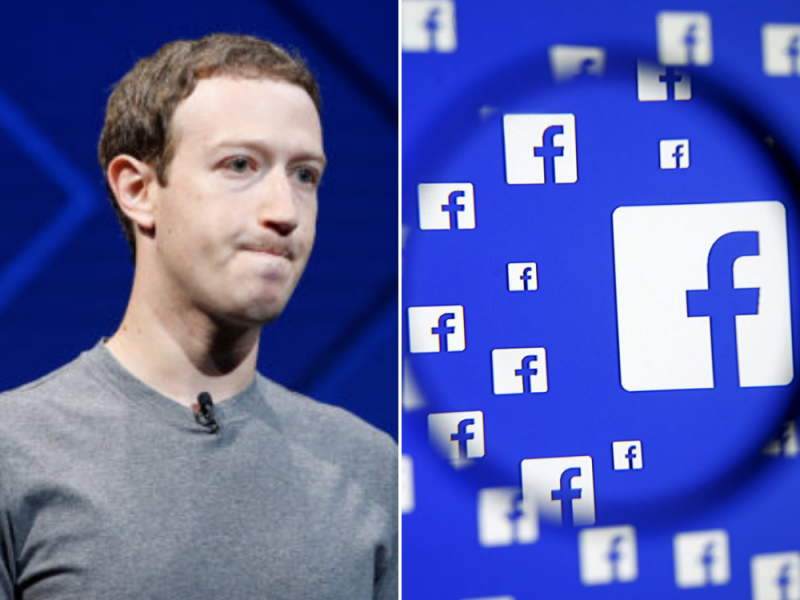
Facebook is led by founder and chief executive Mark Zuckerberg. Picture credit: Reuters/Stephen Lam & Reuters/Dado Ruvic
He added: “It’s preposterous for them to claim they hadn’t seen that five of their six most liked news pages were driving division and whitewashing atrocities. No one will believe they hadn’t noticed.
“Governments will be alarmed that foreign states can openly purchase views for propaganda of this kind. Facebook’s role in this should be taken into account by those currently drafting legislation to regulate tech companies. Prosecutors in the United States may also wish to consider, given the labelling of China’s atrocities as genocide by both former President Trump and President Biden, whether criminal charges could be brought against US entities profiting from China’s state cover-up.
“One of the most important parts of doing business is calibrating the impact of your business not just on your wallet but also on employees, on the communities you serve and, when you are as consequential a business as Facebook, on the world. This is not a technological or legal test, but a moral test – one that Facebook is failing.”
Jason Kint, the chief executive of US publisher body Digital Content Next, said: “It should be outrageous to anyone who cares about the gears of democracy, even humanity, that in the very same week Facebook has announced it will reduce legitimate political news on its platform, it is booking revenue from Chinese state TV covering up genocide.”
A Facebook spokesman said: “As part of our ongoing efforts to provide greater transparency around advertising, Facebook does not allow political ads to run without a disclaimer providing more information about who is running them.
“In this case, we disapproved a number of the ads shared with us for failing to declare they were political in nature, which meant they were not allowed to run on our platform.
“We want to help people better understand who’s behind the news they see on Facebook. That is why we also announced last year our plan to label media outlets that are wholly or partially under the editorial control of their government as part of our wider ads transparency efforts, and will continue to roll this out to more publishers.”
CGTN declined to comment. China Daily and China Xinhua News did not respond to requests for comment.
Note: If you have any insights or information that might add to our investigation, please get in touch: william.turvill@pressgazette.co.uk
This article is part of a series running across our sister titles in the Monitor Network and the New Statesman, looking at the backlash against the big tech companies. If you enjoyed this article, you might like:
- Digital power: How Big Tech draws its influence (Tech Monitor)
- Big Tech lobbying: The US bills tech giants targeted in 2020 (Tech Monitor)
- Adam Curtis: “Big Tech and Big Data have been completely useless in this crisis” (New Statesman)
Email pged@pressgazette.co.uk to point out mistakes, provide story tips or send in a letter for publication on our "Letters Page" blog
